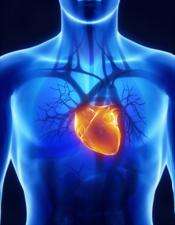Device saves lives in heart failure patients

(Medical Xpress)—A new study shows for the first time that cardiac resynchronization therapy with defibrillator (CRT-D therapy) saves the lives of mild heart failure patients over the long term.
The study was presented today at the American College of Cardiology's 63rd Annual Scientific Session in Washington, DC and published simultaneously in the New England Journal of Medicine. It found, after 7 years, that the likelihood of death was 18 percent among patients with mild heart failure and a common condition called left bundle branch block who received CRT-D therapy. Among patients with the same condition who received a defibrillator only, the likelihood of death was close to 30 percent. Left bundle branch block results in disorganized electrical activity throughout the heart.
The finding translates into a 40 percent reduction in the risk of long-term death among patients with left bundle branch block who received CRT-D therapy.
The study is a follow-up to the MADIT-CRT trial, which showed that early intervention with CRT-D therapy in mild heart failure patients with left bundle branch block led to a significant reduction in heart failure events, such as being hospitalized with heart failure symptoms, over 2.5 years. Study authors believe that the decrease in heart failure events helped patients live longer during long-term follow-up.
"With cardiac resynchronization therapy we have the ability to slow the progression of heart failure, reduce death and increase the life span of patients," said Arthur J. Moss, M.D., professor of Cardiology at the University of Rochester School of Medicine and Dentistry. Moss has led the MADIT (Multicenter Automatic Defibrillator Implantation Trial) series of studies since 1990.
CRT-D therapy combines a defibrillator, which senses dangerous heart rhythms and shocks the heart back into a normal rhythm, with cardiac resynchronization therapy, which improves the mechanical pumping action of the heart. In mild heart failure patients with left bundle branch block, the heart muscles contract against one another, not in concert with one another, as they do in a normally functioning heart. Resynchronization therapy serves as a pacing system that organizes the contractions so the heart can pump blood throughout the body more effectively, reducing heart failure and its symptoms.
In addition to Moss, Valentina Kutyifa, M.D., Ph.D., research assistant professor of Cardiology, and Helmut Klein, M.D., adjunct professor of Cardiology from the University of Rochester, and Ilan Goldenberg, M.D., professor of Cardiology at the Sheba Medical Center in Tel Aviv, Israel, are senior authors on the study.
The study included close to 1700 patients who survived the initial MADIT-CRT trial. Patients received CRT-D therapy or a defibrillator and were followed for approximately 5 years after the conclusion of the 2.5-year MADIT-CRT trial. Patients were evaluated during long-term follow-up and heart failure events and deaths were recorded.
The study included patients from the U.S., Canada, Israel and several countries in Europe, including Hungary, Germany, England, Ireland, Italy, Spain, France, Denmark and the Netherlands. Kutyifa, who received her appointment as research assistant professor from the University of Rochester School of Medicine and Dentistry in December 2013, played a key role in securing the involvement of many European countries, which Moss says contributes to the strength of the study.
In 2010, based on the findings from the initial MADIT-CRT trial, the FDA extended the approval of CRT-D therapy to patients with mild heart failure and left bundle branch block. The device, developed by Boston Scientific, was originally approved to treat patients with severe heart failure. Study authors believe the new data on long-term survival will be added to national and international treatment guidelines in the coming years.
The long-term MADIT-CRT follow-up study was supported by unrestricted research grants from Boston Scientific, St. Paul, Minnesota, to the University of Rochester School of Medicine and Dentistry and the Israeli Association for Cardiovascular Trials.
Moss holds no stock in any device company and has never been a member of any corporate speakers' bureau. Kutyifa has nothing to disclose.
















